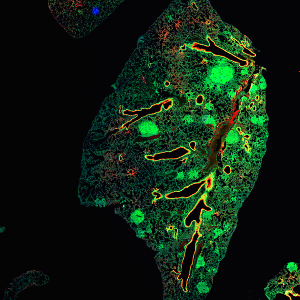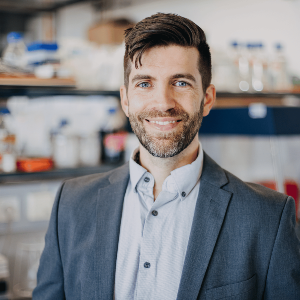Targeting resistant cancer types with new therapeutics
11 Jan 2024
German-Israeli collaboration to research aggressive tumors receives over 1.5 million euros in funding
11 Jan 2024
German-Israeli collaboration to research aggressive tumors receives over 1.5 million euros in funding

Deubiquitylating enzymes (green) are overrepresented in tumors and prevent the degradation of oncoproteins. | © Diefenbacher Lab: Nikolett Pahor & Oliver Hartmann
An international research project on the subject of “Understanding and targeting degradation-resistant tumors” has been granted funding of 1.655 million euros through the German-Israeli Project Cooperation (DIP) program. The project includes scientists from LMU, the Technion – Israel Institute of Technology in Haifa, Goethe University Frankfurt, and Helmholtz Munich. The DIP program was established in 1997 by the German Federal Ministry of Education and Research (BMBF) to strengthen excellence in German-Israel research cooperation.
The project will investigate to what extent short-lived, degradable oncoproteins are subject to enhanced stabilization, which is a typical characteristic of many aggressive and therapy-resistant cancer types. “The decoding of the molecular and cellular foundations of the oncoprotein stabilization pathways and the development of therapeutics that target these cancer types are urgently required and would cover an unmet clinical need,” says LMU professor and group leader at Helmholtz Munich Markus Diefenbacher. The project partners from Germany and Israel want to combine their expertise to research fundamental mechanisms that promote tumor formation. To this end, they are using highly advanced chemical and biochemical methods from the field of targeted protein degradation in combination with fly and mouse genetics as well as clinical studies and data. “With our pooled expertise, we will investigate new levels of protein regulation, including enzymes and mechanisms that are fundamental for the formation of degradation-resistant tumors,” explains Diefenbacher.

Prof. Markus Diefenbacher | © Benedikt Knüttel – Bkfotofilm, Würzburg
In implementation of the project, the Chair of Experimental Pneumology at LMU’s Faculty of Medicine and the Institute of Lung Health and Immunity (LHI) at Helmholtz Munich are to play a key role as innovation hubs. Diefenbacher’s research group will facilitate access to modern technologies, including adeno-associated viruses for gene transfer, and genetically tailored pre-clinical model systems. Through close cooperation with doctors at University of Munich Hospital and Asklepios, so-called organoids – that is to say, organlike structures – based on individual cell cultures from lung cancer patients, along with in-vivo and ex-vivo models, will play a key role in the discovery of new weak points in tumors and enable the consortium to test innovative therapeutics at an early stage.
“By generating a comprehensive and fundamental understanding of the underlying molecular mechanisms of degradation-resistant tumors, we will be in a position to develop novel inhibitors and degradation products (PROTACs), which will be directly relevant for the development of novel therapeutics,” says Diefenbacher.